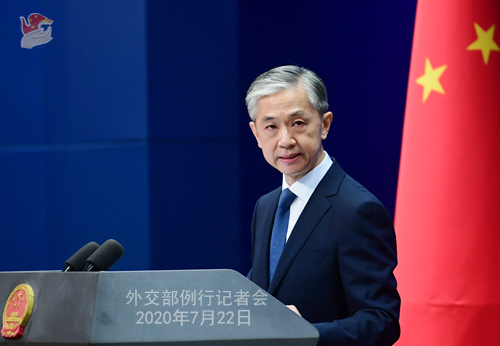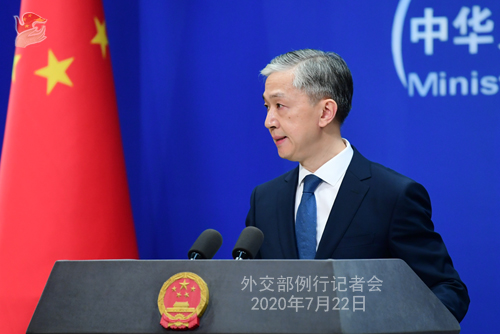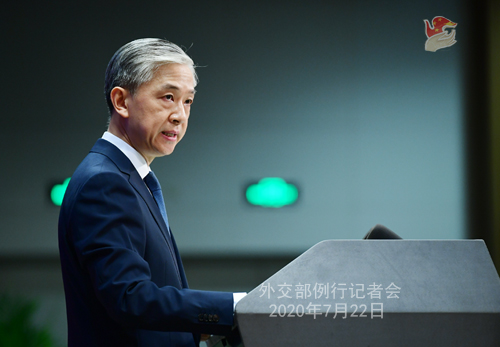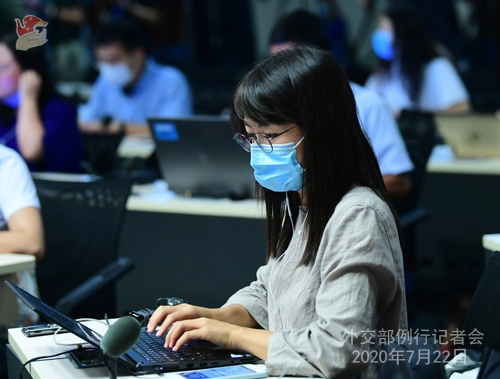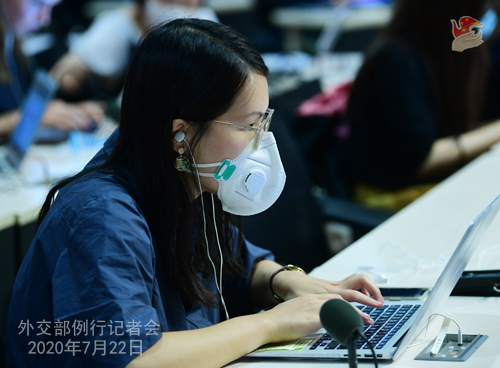| Foreign Ministry Spokesperson Wang Wenbin's Regular Press Conference on July 22, 2020 |
| 2020-07-22 22:55 |
|
China and Latin American and Caribbean countries will hold a special foreign ministers' meeting on COVID-19 through teleconference on the morning of July 23. State Councilor and Foreign Minister Wang Yi and Mexican Foreign Minister Marcelo Ebrard Casaubón will co-chair the meeting. The Paper: According to US sources, China's consulate general in Houston has been required by the US to cease all operations and events no later than 4:00pm on July 24 and all personnel are required to depart. Can you confirm this? Wang Wenbin: On July 21, the US abruptly demanded that China's consulate general in Houston cease all operations and events. It is a political provocation unilaterally launched by the US side, which seriously violates international law, basic norms governing international relations and the bilateral consular agreement between China and the US. China strongly condemns such an outrageous and unjustified move which will sabotage China-US relations. We urge the US to immediately withdraw its erroneous decision, otherwise China will make legitimate and necessary reactions. For some time, the US government has been shifting the blame to China with stigmatization and unwarranted attacks against China's social system, harassing Chinese diplomatic and consular staff in the US, intimidating and interrogating Chinese students and seizing their personal electronic devices, even detaining them without cause. The unilateral closure of China's consulate general in Houston on short notice is an unprecedented escalation of its recent actions against China. China is committed to the principle of non-interference in other countries' domestic affairs. Infiltration and interference is never in the genes and tradition of China's foreign policy. Chinese diplomatic missions in the US are dedicated to advancing the two peoples' mutual understanding and friendship. Pursuant to the Vienna Convention on Diplomatic Relations and the Vienna Convention on Consular Relations, China provides convenience for US diplomatic missions and personnel in China. However, the US has imposed restrictions on Chinese diplomatic personnel in the US twice without cause, in last October and this June respectively. It opened without permission Chinese diplomatic pouches multiple times, and seized Chinese items for official use. As the US flagrantly drums up stigmatization and fans hatred against China, our embassy in the US recently has even received bomb and death threats on Chinese diplomatic missions and personnel in the US. And the US embassy constantly publishes on its website articles smearing China. If we compare the two, it is only too evident which is engaged in interference, infiltration and confrontation. The US claims lack of reciprocity in relations with China. This is just its old ploy that's completely unjustified. As a matter of fact, the US far outnumbers China when it comes to diplomatic missions and staff in each other's country. We urge the US to immediately revoke this erroneous decision. Should it insist on going down this wrong path, China will react with firm countermeasures. CRI: Latin America and the Caribbean have become a new epicenter of the COVID-19 pandemic. What's the special significance of this meeting against this broad backdrop? Wang Wenbin: As the COVID-19 pandemic wreaks havoc around the world, China and Latin American and Caribbean countries, though oceans apart, have stood together against this common foe and conducted practical and effective cooperation to the benefit of all our people. Convening this special foreign ministers' meeting against such a background will consolidate consensus between the two sides on jointly fighting the pandemic, cement political mutual trust, uphold multilateralism, build with concrete steps a community with a shared future for China and Latin American and Caribbean countries, and contribute to fostering a community for all mankind.
Reuters: A follow-up question regarding the Houston question. Local firefighters say there was a fire at the embassy. Do you have any comment on this activity? Wang Wenbin: China's consulate general in Houston is operating as normal. CNR: The US previously said it had evidence that the novel coronavirus came from the Wuhan Institute of Virology (WIV). The US Department of State recently published a cable regarding US officials' visit to the WIV in 2018, which again draws attention from the international community. I wonder what is your comment on that? Wang Wenbin: I noticed relevant reports. Regarding the Wuhan Institute of Virology, Mr. Yuan Zhiming, president of the Chinese Academy of Sciences Wuhan Branch and director of China's National Biosafety Laboratory, gave a thorough response during his recent interviews. He stressed that the lab has high-standard biosafety facilities and a strict management system, and all researchers are allowed entry into the lab only when they have qualifications and get approved after systemic training on theories and operations. Several US politicians have breached the bottom line of morality by spreading all sorts of rumors and even claiming there was "enormous evidence" to support its so-called "truth". The reports reveal to the world once again there's barely anything convincing in its "evidence" or "truth". Even leading experts in the US said they didn't see evidence to support the idea that the virus was released deliberately or inadvertently. Speaking of the truth, we hope the US government can respond to the call of the American people and the international community by telling the truth about the Fort Detrick lab. Reuters: The US Justice Department on Tuesday indicted two Chinese nationals for espionage crime, saying the crimes were over 10 years and targeted defense contractors and COVID researchers. They also said the pair were contractors for the Chinese government. Does the foreign ministry have any comment on this? Wang Wenbin: The Chinese government is a staunch defender of cybersecurity. We firmly oppose and fight all forms of cyber attacks and cyber crimes. We urge the US to immediately stop slandering China under the pretext of cyber security. I'd like to bring to your attention that according to American media, US hackers are expanding their scope of cyber theft following the government's authorization. Prism and other similar cases have proved that the US has been conducting cyber thefts of the largest scale around the world. The US accusing other countries of cyber attacks is like a thief crying "stop the thief". It is even more concerning that hackers backed by the US government don't even need high-level authorization before they launch cyber attacks against other countries' infrastructure, which leads to greater damage than cyber theft as it could easily trigger strategic miscalculation and thus serious consequences. Safeguarding peace and stability of cyber space serves the common interests of all countries. The cyber space shouldn't be a new battlefield. Countries that seek hegemony in cyber space through an offensive cyber strategy will only end up hurting themselves.
South China Morning Post: Can you tell us more specifics in the US note sent to China on ceasing all operations and events of the Consulate General in Houston? Is there a deadline, like within 72 hours? On what ground did the US ask China to close its consulate general? Wang Wenbin: Like I said, on July 21, the US abruptly demanded that China's consulate general at Houston cease all operations and events. It is a political provocation unilaterally launched by the US side. We urge the US to immediately withdraw its erroneous decision, otherwise China will make legitimate and necessary reactions. Reuters: I want to ask that by closing the consulate, will the Chinese nationals working within the consulate be returning to China or will they be able to remain in the US? Wang Wenbin: In response to the US unjustified move, China will make necessary reactions to safeguard our legitimate rights and interests. China Daily: On July 20 local time, the Council of the European Union decided to authorize the signature on a China-EU agreement of geographical indications. It is the first major bilateral trade agreement that will protect each side's 100 geographical indications. Does China have any comment on this? Wang Wenbin: China welcomes that the EU authorized the signature on a China-EU agreement of geographical indications (GIs). Since the talks on GIs were concluded in October 2019, China and the EU have been respectively going through internal procedures for ratification, and China has been completed the procedures. This is China's first comprehensive, high-level bilateral agreement on GIs, and the first major trade agreement between China and the EU in recent years. It is a monumental agreement that will deepen trade cooperation, deliver greater benefits to Chinese and European people, and demonstrate the Chinese government's resolve in advancing high-level opening up and the protection of IPRs. China is ready to work with the EU to expand two-way openness, deepen practical cooperation, achieve win-win outcomes and contribute to economic recovery in China, the EU and beyond. NHK: Chinese coast guard ships have been patrolling in waters off Diaoyu Dao for 100 consecutive days, and Japan has repeatedly protested to China. Why is China patrolling in the waters? Wang Wenbin: Diaoyu Dao and its affiliated islands have been China's inherent territory since ancient times. The patrol and enforcement of law by the China Coast Guard vessels in waters of Diaoyu Dao is China's inherent right. We do not accept Japan's so-called "protest". The two sides should act in accordance with the four-point principled consensus, properly manage the situation and prevent the escalation of tensions. Xinhua News Agency: According to reports, on July 20, Indian External Affairs Minister S. Jaishankar said at a meeting that "non-alignment was a term of a particular era and geopolitical landscape", but India will never be part of an alliance. Global shifts, including the United States and China, were opening spaces for middle powers like India, Japan, the European Union and others. He also said that "The consequence of repositioning of the United States, that the big umbrella is now smaller than it used to be, has allowed many other countries to play more autonomous roles. It doesn't affect us as much because we were never part of an alliance system and we will never be. But countries who depended more on the US are finding they have to take a call themselves on many issues". What's your comment on this? Wang Wenbin: We note relevant reports. We hope and believe that India, as an important force as we head toward a multipolar world, will be able to maintain its independent foreign policy and safeguard regional peace and stability through concrete actions, and play a constructive role in international affairs.
South China Morning Post: US Defense Secretary Mark Esper said he hopes to visit China by the end of the year to "establish the systems necessary for crisis communications" and have better cooperation and negotiation with China. I wonder if China is open to or do you welcome his intention? Wang Wenbin: We note the remarks by Secretary Esper. As to your specific question, I refer you to the Ministry of National Defense. Military-to-military ties are an important part of China-US relations. We hope the US could create a positive atmosphere for exchange and dialogue between the two countries and militaries. AFP: Mike Ryan of the WHO said on Friday that the advance team of experts sent to China is still in quarantine.When will they be released from quarantine and are they currently working out of the hotel?And what nationalities are the team members?And will they have full access to all relevant records, sites and laboratories for their investigation? Wang Wenbin: China and the WHO have been in close communication and cooperation since COVID-19 broke out. Now China is at a crucial stage of preventing both case import and domestic resurgence. Despite this arduous task, we are the first to invite WHO experts in to discuss science-based origin tracing in a bid to support more effective global response. It is our contribution to international anti-virus cooperation and global public health. This fully demonstrates China's openness, transparency and high sense of responsibility. Dr. Ryan also said that for any country, inviting an international team in and working openly with it is an additional step. We hope all relevant countries will adopt a positive attitude like China and cooperate with the WHO. Bloomberg: Mike Pompeo on July 21 has praised Britain for its tough stance on China and signaled that the UK and the US are planning more coordinated action against Beijing. We're wondering if you had any comments on this. And in addition, China and France have said that they are looking to cooperate more on 5G as well as aircraft purchases. Could you comment on this? Wang Wenbin: I will take your second question first. Vice Premier Hu Chunhua of the State Council and French Economy and Finance Minister Bruno Le Maire co-chaired the 7th China-France High Level Economic and Financial Dialogue on July 21, during which the two sides exchanged in-depth views on anti-epidemic cooperation, international macroeconomic policy coordination and bilateral cooperation in key areas and major projects and reached multiple outcomes. China has issued relevant press release regarding the specifics. With regard to 5G cooperation, China and France will jointly safeguard a fair and non-discriminatory market environment and encourage companies from all countries to participate in 5G network construction in accordance with market-based and security principles. On aircraft procurement, China and France attach great importance to and are willing to strengthen their strategic partnership in the aviation field. The two sides support Airbus and Air China to deepen cooperation on the basis of mutual benefit and friendly consultation. On your first question, Pompeo has for a while spared no efforts to attack and discredit China, including with willful ideological attacks, and to paint China as a threat. His rhetoric is full of lies and deception, exposing the serious strategic miscalculation in the China policy of the US fraught with McCarthyist paranoia. Truth is sharpened by debate, but a lie is still a lie even if repeated a thousand times. Pompeo claimed that the novel coronavirus came from Wuhan, but he could not show any evidence. He also claimed that the virus originated in a laboratory in Wuhan, but still no proof. His latest claim is that China was exploiting the pandemic to further its own interests, again with no evidence. It is an open secret that Pompeo keeps contradicting himself with remarks that don't hold water not because he cannot see the truth, but because he deliberately exploits the pandemic for political gains, covering up one lie with another. What Pompeo said has no credibility at all. The US efforts to form coalitions and stir up ideological confrontation in international relations run counter to the trend of peace, development and cooperation and the wishes of most countries in the world. It is bound to fail. Since the outbreak of COVID-19, China has been sharing information with the international community in an open, transparent and responsible manner, actively participating in international cooperation, and providing assistance and support for other countries to the best of its ability. China's efforts and achievements in the fight against the global pandemic are universally acknowledged. Strong and resilient the tree stands, no matter which way the wind blows. As a responsible major country, China will firmly safeguard its sovereignty, security and development interests, firmly reject bullying and injustice, and strengthen dialogue and cooperation with other countries to build a community with a shared future for mankind.
AFP: So France criticized the imprisonment of Uyghurs as unacceptable and called for independent human rights observers to be let into Xinjiang. Will China let international human rights observers or UNHCR enter Xinjiang? Wang Wenbin: The Chinese side has repeatedly responded to and rebuked the false reports and accusations surrounding Xinjiang. The issue concerning Xinjiang is by no means about human rights, religion or ethnicity, but about combating violent terrorism and separatism. I would like to take this opportunity to talk at some length about the real human rights situation in Xinjiang. Let's begin with the lie calling the vocational education and training centers in Xinjiang concentration camps where up to one million Uyghurs are detained. So what is the truth? The truth is that the vocational education and training program is a meaningful and useful exploration in preventive counter-terrorism and deradicalization. The aim is to eradicate extremism and prevent the escalation of violent terrorist activities. The basic principle of respecting and protecting human rights in accordance with China's Constitution and law is strictly observed in these centers to guarantee that the personal dignity of trainees is inviolable. Personal insult and maltreatment in any way is strictly prohibited. All trainees enjoy freedom of movement. The centers are run as boarding facilities and trainees can go home and ask for leave to tend to personal businesses. Trainees' right to use their own spoken and written languages is fully protected. All rules, regulations, curriculum tables and menus are in the common language and languages of ethnic minorities. The customs and habits of different ethnic groups are fully respected and protected. A variety of nutritious halal food is provided for free to trainees of ethnic minorities. Freedom of religious belief is fully respected and protected. Trainees can decide on their own whether to attend legitimate religious activities when they go home. The part about one million Uyghurs detained is also a groundless lie. This sensational rumor was first started and spread by the Network of Chinese Human Rights Defenders, a non-governmental organization supported by the US government. This organization, based on interviews with just eight Uyghurs and rough estimates, concluded that one tenth of the 20 million people in Xinjiang are detained in the so-called re-education camps. Such a shoddy technique is just preposterous. Now let's turn to the lie of discrimination against ethnic minorities in Xinjiang. What is the truth? The truth is that Xinjiang believes that the well-being of all ethnic groups is the cornerstone of lasting social stability. In this region, China's ethnic policy, the Constitution, and Law of the People's Republic of China on Regional Ethnic Autonomy are faithfully upheld. All ethnic groups are equals with the right to participate equally in the administration of state affairs and to independently manage their own ethnic affairs in their respective regions. Efforts are made to promote the unity of all ethnic groups and their common prosperity and development. This has consolidated socialist ethnic relations featuring equality, solidarity, mutual assistance and harmony. There is no so-called discrimination against ethnic minorities or wiping out of their ethnic identity. The government of the Xinjiang Uyghur Autonomous Region fully protects the customs and habits of all ethnic groups in diets, festivals, weddings and funerals, guarantees their right to use and develop their spoken and written languages, ensures the protection and inheritance of their fine traditional culture, encourages ethnic minority members to run for positions in public offices, and guarantees the right of people of all ethnic groups to participate in the management of state affairs on an equal footing and to independently manage the affairs of their own ethnic groups in their respective regions. Xinjiang resolutely safeguards ethnic unity, and with such programs as "Pair Up and Become Family", promotes the harmonious coexistence, solidarity and development of all ethnic groups. There are also lies that religious freedom have been restricted and Muslims oppressed in Xinjiang. But what is the truth? The truth is that recently some politicians and media in the United States and the West have stigmatized the fight against terrorism and extremism in Xinjiang in accordance with law as restriction of freedom of religious belief and oppression against Muslims. They have even made up lies about the imprisonment and persecution of religious figures. But in fact anti-terrorism and deradicalization endeavors in Xinjiang have been conducted under the rule of law and do not target any particular ethnicity and religion. Those who are punished for their crimes in accordance with law are criminals who propagate extremist religious ideas and engage in separatist, infiltration, sabotage and violent terrorist activities under the cloak of religion. They exclude and persecute religious figures who practice the idea of moderation and righteousness, take advantage of the religious feelings of the believers, spread extremism, willfully distort religious doctrines and rules, and link extremism with religion. They deny all secular concepts and achievements of modern civilization, preach that "jihadist martyrs go to heaven", incite the religious believers to regard all those who refuse to follow the extreme practices as "pagans", and turn some people into terrorists whose mind is completely controlled by them. At the same time, the government of the Xinjiang Uyghur Autonomous Region protects the freedom of religious belief of people of all ethnic groups in accordance with law and t is entirely up to citizens to choose whether they believe in a religion or not. It continuously improves public service in mosques, sets up the China Islamic Institute and its eight branches to train reserve Islamic talents, and translates and publishes religious classics in Chinese, Uyghur, Kazak and Kirgiz languages. Since 1996, the government of the Xinjiang Uyghur Autonomous Region has arranged charter flights for more than 50,000 Muslims to make pilgrimages to Saudi Arabia. Facts have proved that China's religious policy conforms to China's national conditions and Xinjiang's reality, and the constitutional principle of freedom of religious belief has been fully implemented in Xinjiang. Anyone that respects the facts cannot deny the situation of freedom of religious belief in Xinjiang today. We firmly oppose politicizing religious issues and interfering in other countries' internal affairs under the pretext of religious issues. We welcome those with a truly objective and fair attitude to visit Xinjiang and see for themselves the real situation and avoid being blinded by these rumors and slanders. AFP: Thank you for the comprehensive description of the programs in Xinjiang. I just wanted to clarify the vocational and educational programs that you mentioned in Xinjiang. Are you referring to programs that are in operation today or programs that have been in operation in the past? Wang Wenbin: All trainees who received courses in standard spoken and written Chinese, understanding of the law, vocational skills, and deradicalization have completed their training, secured stable employment in the society and are living a normal life.
|
| |||||||||||||||
|
|||||||||||||||


